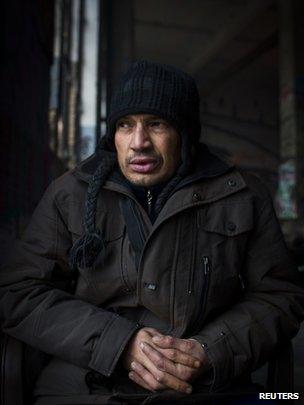Romania and Bulgaria migration issue divides Germans
- Published
- comments

Bulgarian Roma man Dimitar Todorov was living in a squat in Berlin last month
It is not just the Brits who are arguing over migrants and what benefits they should receive. In Germany, the first political argument of the New Year and the first divisions within the new coalition have been over migrants.
At the first cabinet meeting of 2014 - on Wednesday - the issue of migrants has forced its way on to the agenda. Chancellor Angela Merkel - presumably on crutches after her skiing injury - is determined to attend.
In Britain the problem is defined as "benefits tourism". In Germany it is referred to as "poverty migration". The angst has been sparked by the lifting of work restrictions on Bulgarians and Romanians since 1 January. As in Britain, the gulf between what a worker on the minimum wage can receive in Germany and Bulgaria is huge. In Germany the minimum wage will deliver 836 euros (£706; $1,156) a month compared to just 150 in Bulgaria.
So to German politics and step forward Elmar Brok. He is a member of the European Parliament and belongs to Angela Merkel's Christian Democrat party, the CDU. He told Bild that "immigrants who only come to Germany [to obtain benefits] should be sent back to their country of origin". Just to ensure they did not return, he suggested they could be finger-printed. His comments infuriated Romanian Prime Minister Victor Ponta to the point that he accused him of having a "Nazi mind-set".
Then step forward Horst Seehofer, the leader of the CSU, also an ally and long-standing coalition partner of Angela Merkel. He suggested that those who abuse the benefits system should be expelled. He wants a three-month waiting period before migrants become eligible for welfare. Other conservative voices argued for payments to be restricted.
Emergency aid appeals
As in Britain, the opposition cannot avoid the debate. The new German Vice-Chancellor, Sigmar Gabriel, a Social Democrat, said: "We don't need all-out discrimination against the Bulgarians and Romanians but nor should we ignore the problems some big German cities faced with the immigration of poor peoples."
Last November 16 German cities sought emergency aid to help cope with migrants, pointing out that free movement of people had "far-reaching economic and social consequences".
The arguments have cut across party lines. Another conservative politician, Armin Laschet, said such ideas as finger-printing migrants "really don't fit into an open Europe".
So just as the Mayor of London, Boris Johnson, is calling for a two-year ban on migrants receiving benefits and Nigel Farage of UKIP is suggesting a five-year ban, Germany too is having its own debate.
All of this touches on much wider questions.
Germany, in its own way, is arguing over how much power should reside at the national level or go to the European Commission. In an interesting article, Der Spiegel quotes an unnamed adviser to Angela Merkel as saying that "only nation states can justify the reforms that are now truly necessary". Some people close to Angela Merkel are arguing for more Europe to integrate further the eurozone but that does not mean necessarily more Brussels.
It is a time in Europe, which will only intensify in the run-up to the European elections, when some of the defining features of the EU will be argued over and debated.